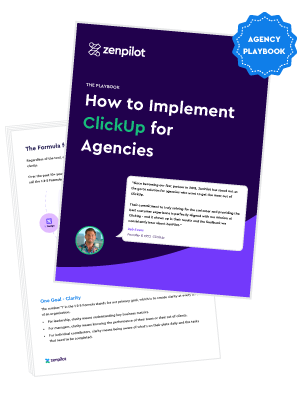How to Improve Your Marketing with Data
To chat with Gray and have ZenPilot lead your team through the last project management implementation you'll ever need, schedule a quick call here.
In this episode of Agency Journey, Pete Brand from MINDSCAPE comes on the show to discuss growing his agency, tracking results, and Growth Driven Design (GDD).
Here are the main takeaways from the interview.
Be Honest with the Numbers
Pete’s background wasn’t originally in marketing. But he was always frustrated by the seeming smoke and mirrors marketers will use to avoid connecting numbers to their work.
At MINDSCAPE, they work hard to make sure clients understand the data.
One way that agencies will be tricky with numbers advertise is with case studies or on the website. An example would be the “800% traffic growth in 2 months” type of verbiage. Depending on the original volume, that may not be that much. However, since it’s not articulated, clients may find themselves with unrealistic expectations or feel deceived. Neither way works for the agency, aside from signing up a frustrated client.
Marketing agencies have a mixed reputation for their honesty and the results they have delivered for clients.
It causes a lot of hesitation with prospects about too good to be true numbers.
Agencies need to be ethical in interpreting and sharing their data and results, even if it doesn’t appear as sexy as what another agency is presenting.
To do all this, though, you need to accurately track all the data from the marketing you do for clients. If you’re adapting based on the data and delivering better results that align with clients’ objectives, you will not only create happier clients, but you’ll have important numbers to show prospects. Stats tied to direct success such as ROI is way more impressive than “+100% page views in one month”.
Learn How to Present What You’re Selling
Pete dives into the issues that he believes some agencies experience when they sell their service. With Growth-Driven Design, the concept is easy to understand, but the verbiage can make it sound like jargon to a prospect or client.
Focusing on using clear and straightforward language that doesn’t use jargon, clients will feel they better understand what they’re being sold and what an agency is doing for them.
Confusion can sow distrust, no matter how good a job you’re doing.
The clear language will make it easier to sell larger clients and give them the confidence that they’re sold a proven system and process.
You also want to present how your work directly ties to their business results. Instead of jargon, articulate how the work helps the business. For example, instead of explaining SEO, talk about how it generates and closes leads to scale and grow consistently.
By avoiding jargon, agencies can do a better job closing and keeping clients.




